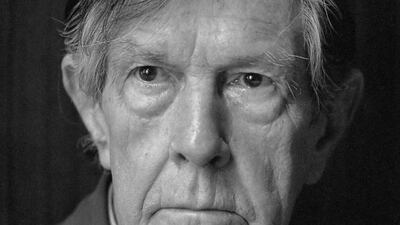John Cage easily ranks among the 20th century’s most influential – and most misunderstood – composers. A quarter-century after his death, the principles Cage first espoused in the 1950s continue to inspire artists and spark debate alike. Fresh converts and detractors will doubtless be formed following a brave evening of multidisciplinary performance at NYU Abu Dhabi on Tuesday April 18, as part of the ongoing Manifold festival.
Cage is remembered as the principle pioneer of indeterminacy and chance in music – concepts which see the performer served deliberately imprecise directions to be interpreted at will, and music composed by random stimuli, such as tossing a coin.
The American avant-garde icon is also known for “inventing” the widely used prepared piano, making homemade percussion from car parts, and for bold electronic experiments cutting and splicing tape.
A Cage performance often strafes into the world of theatre. Instead of conventional notation, musicians are directed by oblique diagrams, coordinates or textual instructions. Live “happenings” embrace audience participation, multimedia, live radio broadcasts and stunts such as pouring water into a bath onstage. Cage once described himself as an anarchist.
“The best way to think about Cage is as a maverick,” says Clare Lesser, an NYUAD music lecturer co-organising this week’s concert.
“He worked in the past in the way a lot of composers work now – in other words, as multifunctional business people. Cage is a philosopher, a composer who very much challenged the established academic musical norms of the mid-to-late 20th century.”
All of which alienates many listeners, who might mistake beauty, freedom or a philosophic statement for mindless noise. Yet believers are keen to point out that Cage’s work swings between both the tender and the violent.
A broad sweep of his conceptual canvas will be embraced at this week's John Cage Circus, which surely marks the largest retrospective of the composer's work the GCC has ever seen. The evening takes its playful name from the programme's centrepiece Scottish Circus, a "folk mash-up" of five disparate musicians playing different things at the same time.
“A lot of people think [Cage] is going to be very disorderly or very disjointed,” adds Lesser. “But there are some very, very beautiful pieces in there.”
Concertgoers will begin in the foyer for Sculptures Musicales, a sound installation by NYUAD students, before moving into The Arts Centre's Black Box. Inside, the programme will continue with diverse works including the delicate, harp-like a capella vocal piece Sonnekus 2, selected readings of Cage's prose, entitled Indeterminacy, Four6, a free improvisation for four musicians, and the coyly named Suite for Toy Piano, Music for Piano, 3 Easy Pieces.
All the works will be performed by students and faculty members of the university’s music and visual arts departments, alongside members of NYUAD Vocal Ensemble.
“What I’m trying to impart to my students is that it’s really good to create while you interpret, so instead of everything being rigidly controlled, you take back control to allow your own creativity to flourish,” adds Lesser. “Instead of writing down definite bars and notes, you can really let your imagination run wild. It’s much closer to theatre in many ways.”
One conspicuously anti-theatrical piece not on the programme is 4'33" – surely Cage's best-known composition – in which, at the premiere, a pianist was instructed to take to the stage and open and close the piano lid three times, at a period of "movements", without playing a note. However any musician or ensemble can "perform" this silent work – a piece anyone could have written, critics have often noted, but as Cage has been quick to respond, no one else did.
“It makes us think about ambient sound,” explains Lesser. “It’s encouraging people to see the interplay between what is actually going on in a space of time during a performance, and what goes on around it. It blurs the boundary.
“There’s always an interesting, undecidable quality to all of Cage’s music. You can take it in two, three, four, five or six different ways – and there are endless ways of performing it. You’ve got a lot of freedom, and a lot of control as a performer.”
John Cage Circus takes place at The Arts Centre's Black Box, NYU Abu Dhabi, Saadiyat Island, on Tuesday April 18, 8pm. Find out more here.
rgarratt@thenational.ae

